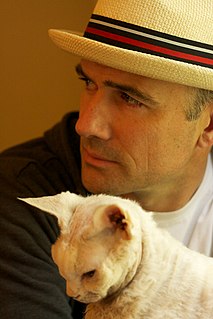A Quote by Mark Z. Danielewski
At the breakfast table we are footnoting everything that we read. We don't recognise it as such but we encounter an article in the newspaper and then suddenly we recall that a friend had a certain comment on that particular story, a certain bit of news that we saw on the television applies to that and we immediately assemble an idea of a story.
Related Quotes
Curiously, the balance seems to come when writing is woven into every aspect of my life, like eating or exercising - one flows constantly into the next: I'll wake up and have coffee, read the news, then write a letter or two (always in longhand), then go teach, and after teaching write a bit in a journal - dreams, what I had for breakfast and lunch and why I had it, what's on the iPod, sexual habits, etc. - then read a bit, then work on a real bit of writing...you get the idea.
The thing that's helped me from wrestling is sometimes when you do live television, things change immediately, so you can be immersed in one story and then the story shifts. Ultimately, if you just get the point of what you're trying to accomplish, if you know the story, then you can put forth a good product.
A lot of people think that they are really cool because they don't outline. In my writing group, they would say, "I will never outline. I let the characters take me." C'mon, man - I outline the story, but it's only like one page. It's a list of possible reversals in the story, like things where everything will just change because of this certain reveal or this certain action. Then I start really digging into the character because, to me, I don't care what the story is.
When a story or part of a story comes to me, I turn it over in my mind a long time before starting to write. I might make notes or take long drives or who knows what. By the time I give myself permission to write, I know certain things, though not everything. I know where the story is headed, and I know certain crucial points along the way.
I just write and do what I think is funny. Sometimes, you do have it in your head about certain bits. There are certain jokes where I know if I did them in certain situations, it would irk people. There are times where I look at the news and see a story going on, and I'm like, 'Wow, if I tweeted this, I would get press if I wanted to.'
It's only a story, you say. So it is, and the rest of life with it - creation story, love story, horror, crime, the strange story of you and I. The alphabet of my DNA shapes certain words, but the story is not told. I have to tell it myself. What is it that I have to tell myself again and again? That there is always a new beginning, a different end. I can change the story. I am the story. Begin.
Say you have a headline like "Mountain Bike Stolen," and then you read the story, read another story about it the next day, and then the next week, and then the next year. News is a process of expansion, the filling in of detail, and making narrative connections - not based on chronology, but based on features of the story. There are narrative connections made between props, between characters, between situations, and so forth.
In any case, you read with exasperation or amusement the multiple errors in a story-and then turn the page to national or international affairs, and read with renewed interest as if the rest of the newspaper was somehow more accurate about far-off Palestine than it was about the story you just read. You turn the page, and forget what you know.
There are certain scenes, certain hills and valleys and groves of pines which demand that a story shall be written about them. I would refine; I would say that the emotions aroused by these external things reverberating in the heart are indeed the story; or all that signifies the story....We translate a hill into a tale, conceive lovers to explain a brook, turn the perfect into the imperfect.


































